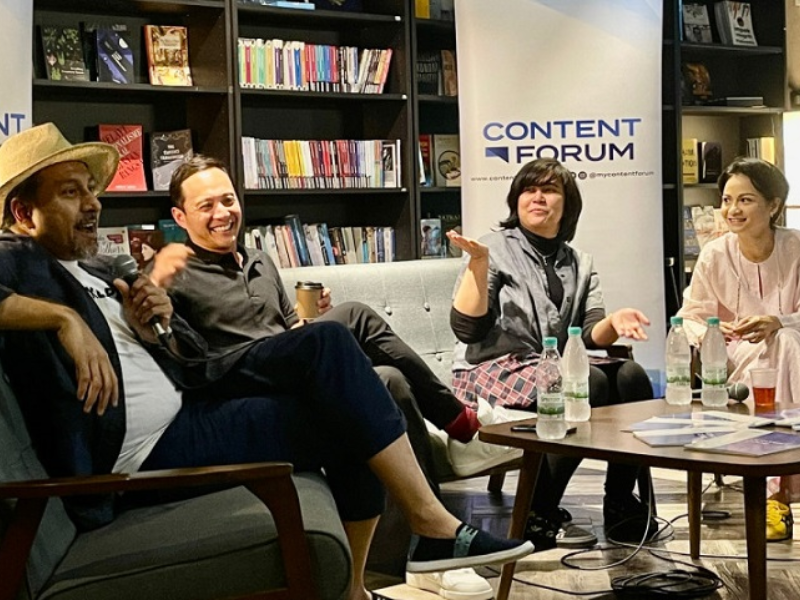
Malaysian Film Industry Professionals Reflect on the State of the Creative Sector
AS the dust settles after a contentious four years of political instability and as a new Pakatan Harapan-led government takes shape, prominent Malaysian actors and writers, Bront Palarae, Redza Minhat, Sharifah Amani and Neddo Khan gathered for a roundtable conversation on the current state of the creative industry.
The two-hour long public forum revolved around a number of issues, from dealing with a Kafkaesque bureaucracy, navigating the changing landscape, and the need for collective action and bargaining from everyone within the film industry.
Redza Minhat (Terbaik Dari Langit, Kil) opened the conversation pensively stating, “I think I’ve been struggling with apathy. I’ve come to a state of whether should I care or should I not care. Caring hurts, and not caring means that I’m just building my own bubble.
“But most of all I fear apathy, because what I see around me is two types of people – those who have struggled so much that they end up bitter and not caring, or those that are doing well and have forgotten what it was like.”
Minhat’s comments struck a nerve and could be linked across all industries, especially in light of a report by Emir Research in May that stated, “an exponential increase of the number of individuals, including highly skilled, leaving Malaysia over the last 40 years.”
Malaysia’s brain drain – estimates reveal over 500,000 Malaysians are dispersed worldwide – have been a subject of conversation for a long time, with no solution in sight.
Sharifah Amani, who came to prominence through the late Yasmin Ahmad’s films, pointed out that Malaysian arts needs to be given more consideration instead of being an afterthought and lumped together with other ministries.
“I was upset because we can see the results of so many years of neglecting the arts on the minds and maturity of our youth.
“We need to address it more seriously and have an arts education that’s more comprehensive rather than just giving students a recorder. We can look at countries like Indonesia who centres and lifts up their own arts and culture.”
Bront Palarae later brought up the example of Cannes Film Festival, among the most prestigious events of its kind in the world that was originally proposed under the French Ministry of Education.
The perceived elephant in the room was Syamsul Yusof’s Mat Kilau which has grossed over RM100 million, making it the most profitable Malaysian film ever made. Yet, the divisive elements within the movie drew ire from members of the panel.
“I understand why [Mat Kilau] made a lot of money. Young people are looking for heroes and looking for someone to look up to. Everyone wants to belong and feel accepted. But what are the conversations they are having in those spaces and what are we providing for them [in lieu of propaganda and divisive films],” Amani said.
During the audience Q&A, Nadira Ilana, who runs Telan Bulan Films, a production company based in Sabah, gave a moving sermon and appealed to everyone present to reimagine what Malaysian cinema and film spaces could look like.
“When I first started as a filmmaker 10 years ago, I couldn’t even find two C-stands (film equipment) in the whole of Sabah. All of you are absolutely right that there needs to be political will here. We have to remember that we have a new government. We are trying to think of a new Malaysia 2.0.
“But we have to be realistic about this. Every time there’s a change in government, all the advisors and policies change with it.
“The policies change faster than we can make a film and because of that it really does impact us economically and impacts us across the country in terms of who gets to have a say.
“We might not be able to change the industry, since those are really big things but as a film community we need to be talking about diversity and inclusion. We need to be listening to more minorities in this room. We need to be hearing from the people who are struggling a little bit more than you are.”
She doubled down on the importance of representation and diversity in our media. “When people don’t know what an indigenous person or minority looks like, that can be the difference between life and death.
“Maybe we’re jaded of producing the same old boring content and apathetic because we’re always playing down the struggles of racism, sexism and homophobia in this country.
“Film clubs have to be more than this Melayu bubble. I think we can do better to try to imagine what Malaysian cinema or stories can look like whether it’s with a new government or just amongst ourselves,” she remarked.
Among the others present at the event were former Finas Director-General Datuk Kamil Othman and actor and producer Datuk Afdlin Shauki.
